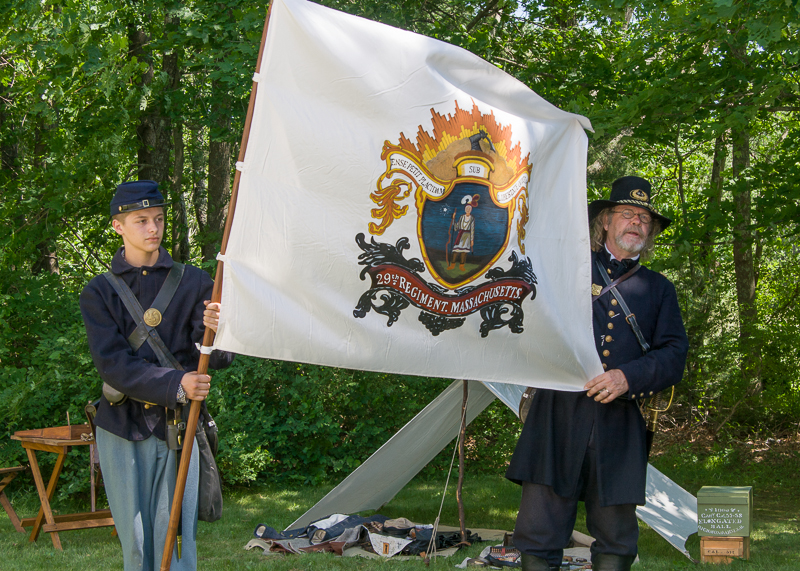





Yesterday, Mom and I went to the Plympton Tea put on by the Historical Society to celebrate the birthday of the town of Plympton. They also recoginize a few people from the town for their contributions. You may recall that we went last year and I posted a photo of the person portraying Deborah Sampson. This year the tea honored Sergeant Samuel Cole Wright, a Civil War hero who was from Plympton. The Civil War militia from Virginia and Bridgewater, MA were on hand to set up a camp and show us some maneuvers the soldiers had to learn.
From the flyer we received at the tea:
The Civil War Soldier’s Monument was built on the Plympton Town Green in 1889. Its inscripition reads “Erected by the Ladies Memorial Association of Plympton to commemorate the deeds of her loyal sons who imperiled their lives for the preservation of the Union 1861-1865.
Sergeant Samuel Cole Wright from Harrbus Corner in Plympotn was one of those loyal soldiers. He participated in thirty battles during his service in the Civil War. He was wounded five times and was reported dead on two separate occasions. In one battle he was shot directly in the right eye with a musket ball. He saved that bullet as a souvenir of his closeness to death.
He enlisted as Private, Company E, 29th Massachusetts Infantry on May 6 1861 at Plymouth. He was wounded in the head by a shell fragment Jan. 30, 1862. On the campaign to Antietam, Sept. 17, 1862, he was wounded in the knee but refused to retreat with his injury, as recommended by his officers; but chose to stay with his regiment and continued fighting.
Sergeant Wright’s fine soldiering, bravery and courage in battle were readily recognized by his superior officers. He received substantial recognition with two promotions on the field of battle for “gallantry in action.” The Medal of Honor was later awarded to him.
In June of 1863 he came down with typhus and was hospialized in Tennessee but that didnt’ prevent his return to battle. He was back with his regiment in time to be wounded in the arm on June 2, 1864. Then in July of the same year, he was hit in the eye with a rifle ball which passed to the back of his head. He was left on the field for dead but, after he was taken from the field, he was able to recover at home for 18 months. He was discharged on Feb. 3, 1865 as Sergeant.
After the war, he received a pension for disabilities due to his wounds. He was a Jusice of the Peace, worked as an auctioneer and operated a store in Plympton. He was born in Plympton Sept. 29, 1842 and died July 6, 1906. His burial place is Oak Grove Cemetery in Plymouth.






Melissa
He had 9 lives! Quite the story.
Jamie
I know, I can’t decide if he was lucky or not. I didn’t know anything about him so it was interesting to learn his history.
shirley
Nice! How hot was it?
Paul Wright
He was my 3rd great grand uncle. Many photos have been handed down to me.
Jamie
Very cool. Glad you found the photos I took although I’m sure the ones you have are even better.